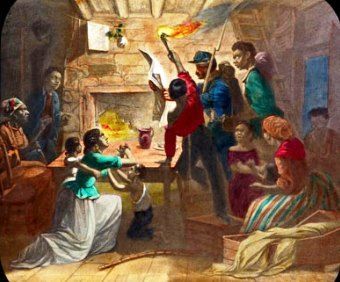July 22, 1861
Emancipation Proclamation is read to the cabinet, by Abraham Lincoln, 1861.
Facts of the Emancipation Proclamation:
1. The main purpose of the Emancipation Proclamation was to keep the Union together. It had nothing to do with any epiphany of morality by the Lincoln and the Republicans.
2. It was not a policy to free slaves, it was a military declaration. The South had succeeded from the Union. The executive order was made to warn the South to rejoin the Union or war against the South would ensue.
3. The source of issue that caused the executive order (emancipation proclamation) was economics, as it always has been with America. The North was concerned about how powerful the South was becoming. Powered by the free labor of slavery the US economy was being driven by cotton, indigo and tobacco from the South. The North wanted to industrialized and move some of the economic strength to the Northern factories and other business entities.
4. Lincoln was advised to delay the executive order (emancipation proclamation) until a North win seemed likely. Secretary of State William Seward suggested that Lincoln wait to issue the executive order until a Union victory could prove that the federal government could enforce it. Many Northerners were uncertain that they would be victorious over the South.
5. One more clue that the executive order (Emancipation Proclamation) was not about freeing slaves that it was not an enforceable action on the south at the time of the order. The South had succeeded from the Union, Lincoln had no power to free slaves in a territory that Union was not ruling over.
6. Lincoln’s executive order (Emancipation Proclamation) did not free any northern slaves, which he actually had authority to free.
7. “I will say then that I am not, nor ever have been, in favor of bringing about in any way the social and political equality of the white and black races,” – Abraham Lincoln
8 . Lincoln owned slaves himself.
9. Lincoln was opposed to blacks having the right to vote, to serve on juries, to hold office and to intermarry with whites.
10. Lincoln believed that colonization—or the idea that a majority of the African-American population should leave the United States and settle in Africa or Central America—was the best way to confront the problem of slavery.
When Lincoln is labeled the great emancipator, most Blacks who are aware of the facts surrounding the Emancipation Proclamation will likely visibly bristle at the notion. American history as well as world history has been consistently viewed from a European lens. The African/black perspective needs to be exposed and taught in our educational systems.


[…] to have freed enslaved Africans in america, actually did not free slaves. He did not free slaves in the North but freed slaves in states that […]
LikeLike